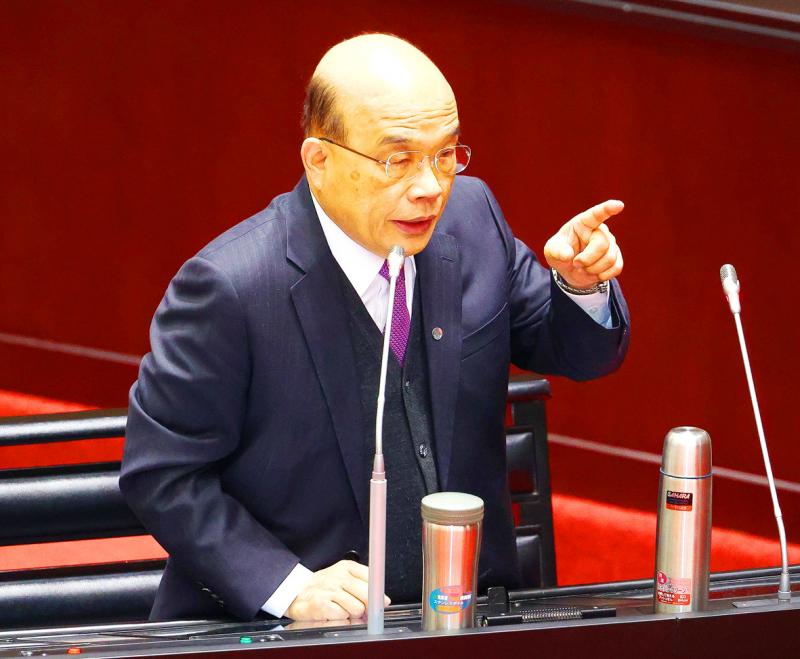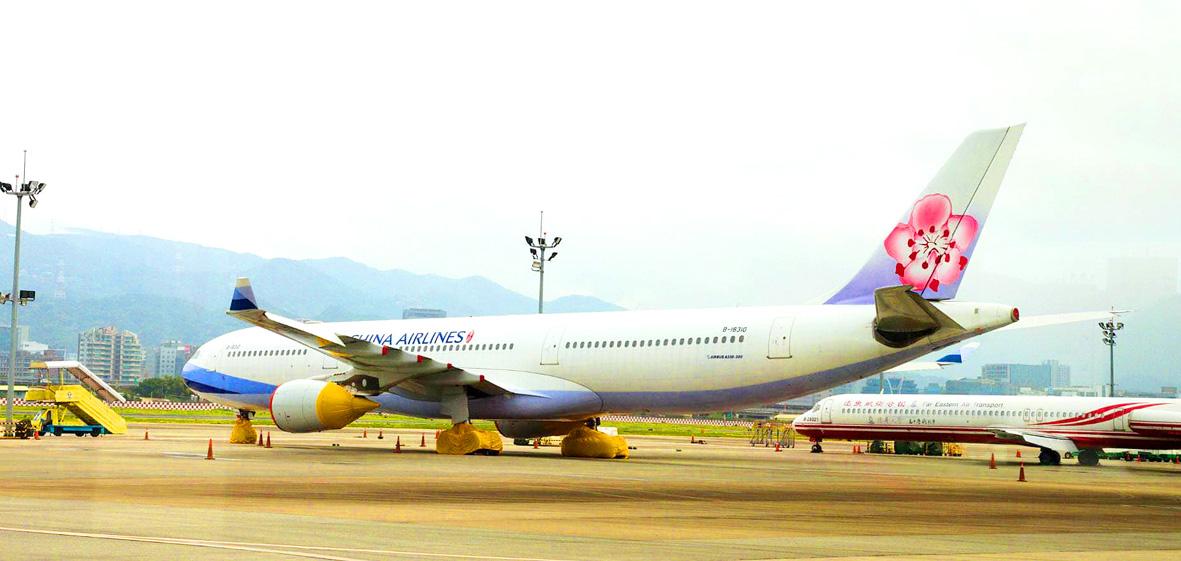Premier Su Tseng-chang (蘇貞昌) yesterday voiced support for changing the name of China Airlines (CAL, 中華航空), but said it was not an easy thing to do, as it could affect the nation’s aviation rights.
Amid calls by lawmakers and members of the public for the national carrier to be renamed, Su told reporters at the Legislative Yuan in Taipei that the government would highlight “Taiwan” on the fuselage of CAL planes delivering donated medical supplies to show that they are not from China.
The issue was raised after photographs of CAL planes delivering shipments of masks donated to European nations led some people outside of Taiwan to think the masks had come from China, which Su said had put the nation at an unfair disadvantage.

Photo: CNA
As of yesterday, an online petition calling for CAL’s name to be changed to “Taiwan Airlines” had 47,000 signatures, while a motion sponsored by Democratic Progressive Party (DPP) Legislator Lin Yi-chin (林宜瑾) to have the nation’s official English-language title changed to “[Republic of] Taiwan” or “Chunghwa” has gained the backing of 17 lawmakers.
Su reminded reporters that Chiang Kai-shek International Airport had been renamed Taiwan Taoyuan International Airport when he first served as premier during then-president Chen Shui-bian’s (陳水扁) administration.
It is great that shipments of donated medical supplies bear the national flag and the slogan “Taiwan can help” on the shipments, but CAL should not try to take credit or use the opportunity to promote itself by displaying its name on fuselages, as this might add to the confusion, he said.

Photo: Hsiao Yu-hsin, Taipei Times
The airline was already working to carry out this directive, as he on Monday told the Ministry of Transportation and Communications to stop CAL from displaying its name on shipments of medical supplies.
The airline could add images or symbols highlighting “Taiwan” on its planes, he said.
DPP Legislator Wang Mei-hui (王美惠) later asked Su whether CAL could be renamed “Taiwan Airlines.”
Su said it would not be easy, as it could affect the nation’s freedoms of the air and air routes.
However, the International Civil Aviation Organization would not interfere with how an airline decorates its planes, as that is entirely up to the airline, he said.
Taiwan’s disease prevention measures have won it a good reputation around the world, so swift action must be taken to change logos on CAL planes to set the nation apart from China, which has gained a reputation for “doing people harm,” Wang told the premier.
New Power Party Legislator Chen Jiau-hua (陳椒華) also asked Su about CAL’s name, but also raised the name of the Chinese Professional Baseball League.
Taiwan is among a handful of nations where baseball games are being played during the pandemic, but the league’s name has led people outside Taiwan to think that the matches are held in China, she said.
The league’s name had “historical reasons,” Su said, agreeing that the two examples she cited have caused confusion about the difference between Taiwan and China.
With the world largely acknowledging Taiwan’s success in containing COVID-19, it is important that the world realizes “Taiwan is not China,” he said.
He did not address the question of the league’s name.
Presidential Office spokesman Xavier Chang (張惇涵) yesterday confirmed that the ministry had asked CAL to “add symbols representing Taiwan” on aircraft being used to carry international donations of medical supplies.
CAL also issued a short statement pledging to adhere to the government’s requests and that it would no longer engage in commercial promotion on the government’s medical equipment donations.
Additional reporting by CNA

DAREDEVIL: Honnold said it had always been a dream of his to climb Taipei 101, while a Netflix producer said the skyscraper was ‘a real icon of this country’ US climber Alex Honnold yesterday took on Taiwan’s tallest building, becoming the first person to scale Taipei 101 without a rope, harness or safety net. Hundreds of spectators gathered at the base of the 101-story skyscraper to watch Honnold, 40, embark on his daredevil feat, which was also broadcast live on Netflix. Dressed in a red T-shirt and yellow custom-made climbing shoes, Honnold swiftly moved up the southeast face of the glass and steel building. At one point, he stepped onto a platform midway up to wave down at fans and onlookers who were taking photos. People watching from inside

A Vietnamese migrant worker yesterday won NT$12 million (US$379,627) on a Lunar New Year scratch card in Kaohsiung as part of Taiwan Lottery Co’s (台灣彩券) “NT$12 Million Grand Fortune” (1200萬大吉利) game. The man was the first top-prize winner of the new game launched on Jan. 6 to mark the Lunar New Year. Three Vietnamese migrant workers visited a Taiwan Lottery shop on Xinyue Street in Kaohsiung’s Gangshan District (崗山), a store representative said. The player bought multiple tickets and, after winning nothing, held the final lottery ticket in one hand and rubbed the store’s statue of the Maitreya Buddha’s belly with the other,

Japan’s strategic alliance with the US would collapse if Tokyo were to turn away from a conflict in Taiwan, Japanese Prime Minister Sanae Takaichi said yesterday, but distanced herself from previous comments that suggested a possible military response in such an event. Takaichi expressed her latest views on a nationally broadcast TV program late on Monday, where an opposition party leader criticized her for igniting tensions with China with the earlier remarks. Ties between Japan and China have sunk to the worst level in years after Takaichi said in November that a hypothetical Chinese attack on Taiwan could bring about a Japanese

‘COMMITTED TO DETERRENCE’: Washington would stand by its allies, but it can only help as much as countries help themselves, Raymond Greene said The US is committed to deterrence in the first island chain, but it should not bear the burden alone, as “freedom is not free,” American Institute in Taiwan Director Raymond Greene said in a speech at the Institute for National Defense and Security Research’s “Strengthening Resilience: Defense as the Engine of Development” seminar in Taipei yesterday. In the speech, titled “Investing Together and a Secure and Prosperous Future,” Greene highlighted the contributions of US President Donald Trump’s administration to Taiwan’s defense efforts, including the establishment of supply chains for drones and autonomous systems, offers of security assistance and the expansion of